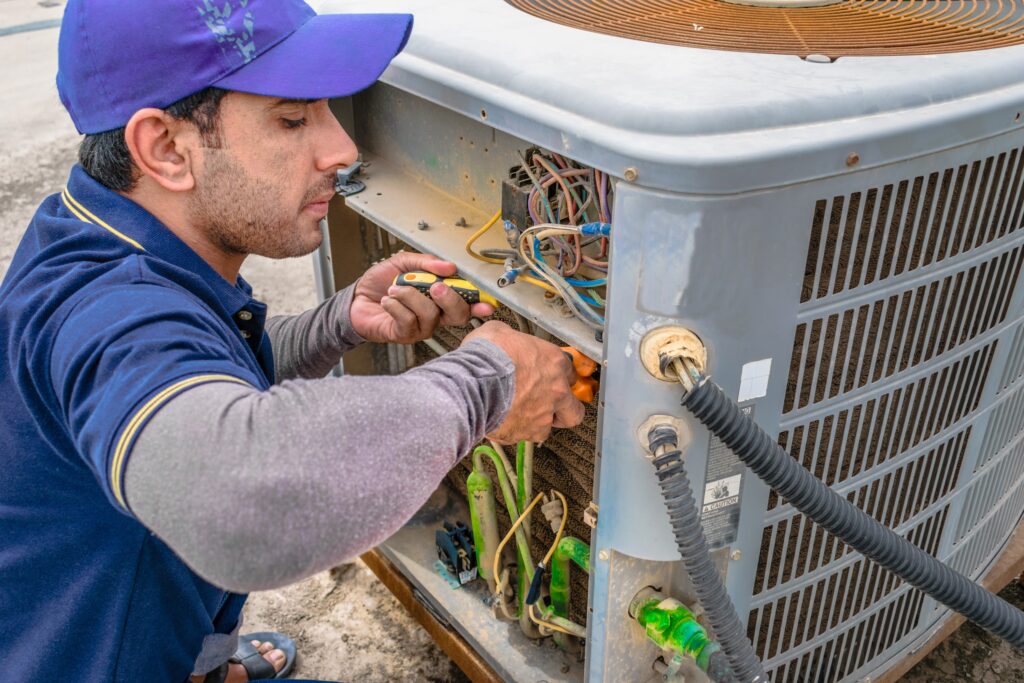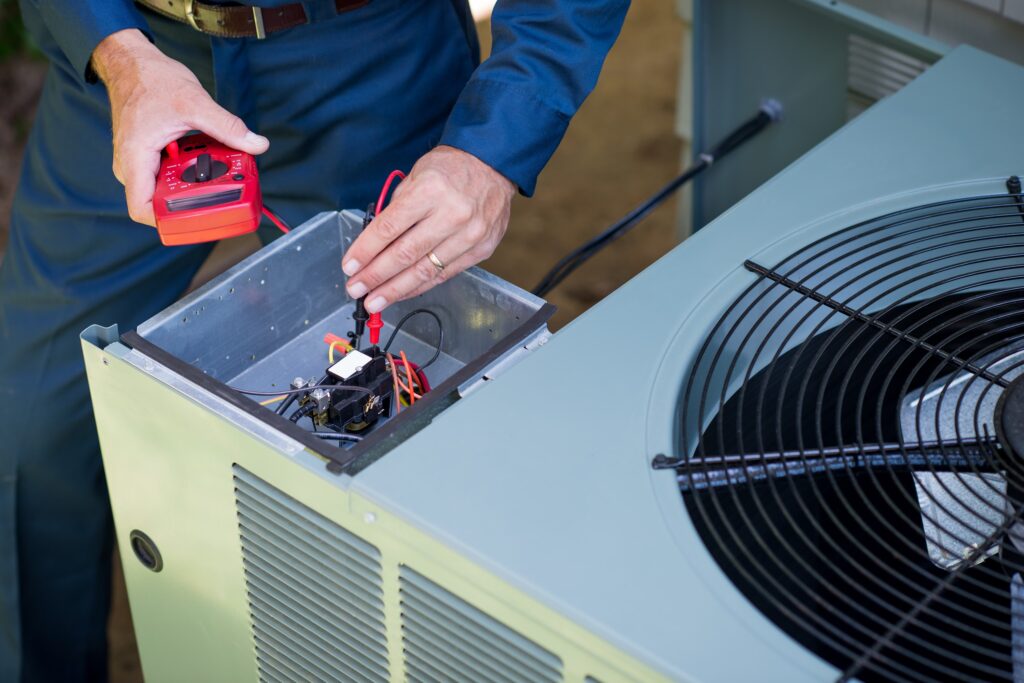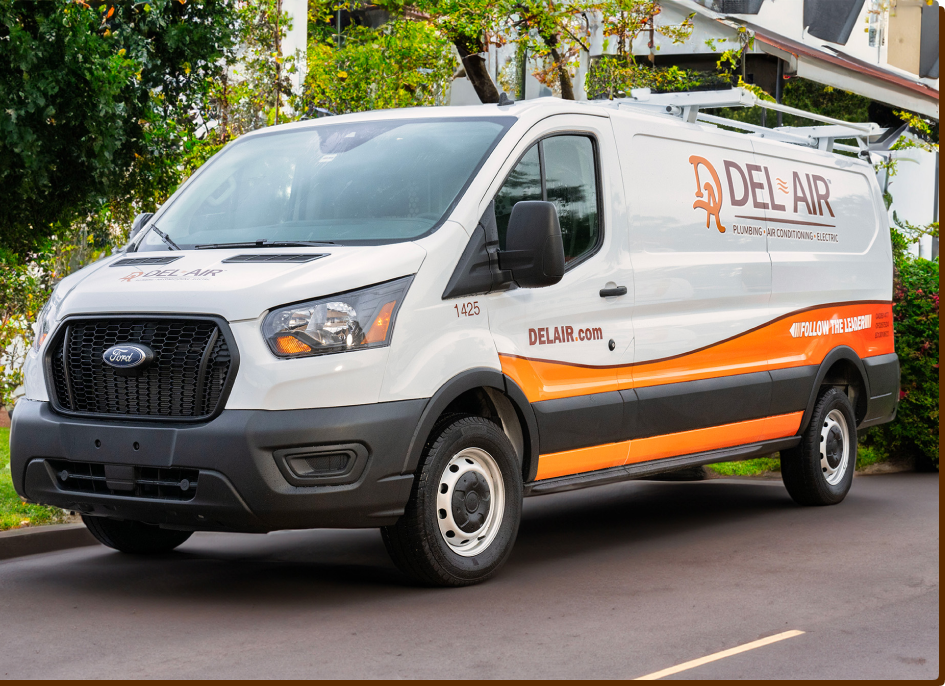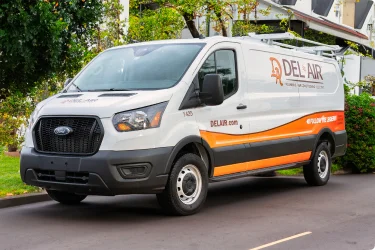
Anyone who lives in Florida knows they need air conditioning for much of the year in order to stay comfortable. Central AC is the most common way people cool their homes in the Sunshine State, and the systems must be equipped for prolonged operation in the hot, humid, salty climate. An air conditioning outage or failure can be downright dangerous.
When you think of air conditioning in terms of how it relates to the comfort and safety of you and your family, friends, and visitors, the importance of a quality system gains priority.
Regular maintenance and good service practices pay off in peace of mind and uninterrupted physical comfort, as well as savings from a system that runs as efficiently as possible and doesn’t generate big, emergency repairs.
After decades in Florida-specific business, Del-Air Heating & Air Conditioning knows the answers to people’s frequently asked questions about all facets of AC and heating. We’re glad to share knowledge and air conditioning maintenance tips that help people avoid problems and maintain their comfort all summer.
Here are 11 questions you can ask to make sure your AC keeps operating at its best:
1. What Is HVAC?
HVAC is an acronym that stands for heating, ventilation, and air conditioning. It’s a short way of describing everything associated with the entire system that processes air, from the compressor, fan, and motor of your AC to the vents, thermostat, and filters. Most Floridians are most concerned with the AC part, but most HVAC systems have some components in common, for example, the ducts in which the air travels.
A typical central AC system draws in outside air and forces it through or over super-cooled evaporator coils containing refrigerant that changes from a liquid to a gas as it works. The process both cools the air and extracts humidity from it, and then the cool air is blown through ductwork and vents to the rooms of your home.
Your central AC unit outside contains a motor, compressor, fans, condenser coil, wires, coolant, and other parts. A motor powers the unit’s movement and runs the compressor.
The compressor pushes refrigerant between the inside evaporator coil and the outdoor condenser coil. As the coolant travels back to and through the condenser coil, it changes back to a liquid state and gets pumped, filtered, and cooled before re-entering the indoor coil to repeat the process.
The air in a central AC system moves through a series of ducts that run through the ceiling and/or walls. The ductwork is usually made of tin or lightweight stainless steel, and the AC system, in general, also includes the air vents and a thermostat control on the wall.
2. Why does my AC need regular maintenance?
On a scale of importance from 1 to 10, regular maintenance ranks as a 10 because it directly relates to your comfort. Air conditioning systems in Florida run for more of the year and for more time each day than units in most other states, plus Florida has higher humidity than nearly anywhere else. These factors make it crucial to perform AC inspection and service consistently.
The key is to check the system often enough to spot any small issues before they turn into an expensive repair and failed unit that leave you hot and uncomfortable until they’re repaired.
Another answer to this question is efficiency. The more efficiently your system functions, the cooler you’ll feel and the more money you’ll save. There are several ways to perform central AC preventative maintenance and help keep your system running smoothly.
3. What kind of things can happen without regular maintenance?
The worst enemy to your entire system is dirt, debris, and particulate matter of all sizes because dirt buildup inhibits airflow and reduces your comfort and the system’s effectiveness and efficiency.
It wastes money and can lead to failure and reduced capacity. Rodents can chew through wires, and other pests can decide to nest in the outside unit. Ducts can sustain damage in several ways, such as a defective seam or accidental hole, and then they might start to leak.
Consider the numerical differences between a clean and dirty system:
- A 3-ton unit with a moderately dirty filter and coil would use about 10,670 kilowatts and cost around $928 per season. The same unit with clean parts would reduce kilowatt usage to 7,675 kilowatts and $615 per season.
- A 5-ton unit with a moderately dirty filter and coil would use approximately 15,165 kilowatts and cost about $1,213 per season. The same unit with clean parts would reduce kilowatt usage to 10,302 kilowatts and $824 per season.
Too many people tend to turn the unit on and see if anything sounds odd, and then cross their fingers that everything holds through the heat. That approach is a gamble because there are multiple parts on the air conditioner that need inspection and service regularly.
For example, Del-Air Heating & Air Conditioning’s preventative maintenance includes all the recommended points of annual maintenance, which generally includes inspection and cleaning of:
- Refrigerant
- Compressor and fan amps
- Condenser coil
- Capacitors
- Contactor points
- Electrical cabinet
- Seal and fit of caps and valves
- Thermostat
- Blower amps
- Heat-strip amps, circuit components and safeties
- Evaporator coil
- Blower wheel
- Electrical connections and wires
- Filter
- Temperature splits
- Lubrication of moving parts
- Vacuum drain line drainage
- Float switch operation
- Air grills and exterior
- General performance
You can also check and clean air ducts and vent openings, visually inspect the unit anytime you walk past it, and keep it clear of debris like leaves, branches, and dirt. All of these actions qualify as air conditioning preventative maintenance.
4. How often should I service my AC in Florida?
Experts usually advise a check of the system at least once per year, and during spring is the best time to do it, so your system is ready before summer. It’s always best to check the system again if and when you transition to heat, when it’s been off for many weeks, or when you run it year-round. Some high-usage applications may demand system maintenance more often than annually.
5. Why is it important to change the filter & how often should I do it?
The filter allows air to flow through, but it catches dust, hair, dirt, allergens, and germs, to enhance indoor air quality and protect the mechanical parts of your system. Change a disposable filter or clean a washable filter at least once a month and more often if you have tough conditions such as heavy dust, high traffic, or lots of pet hair.
There are many different kinds of filters capable of improving the indoor air quality of your home, and the type of AC you have may dictate what kind of filter you need. Personal preference will also help decide how vigilant you want to be about air quality.
Generally, the filter sits inside the home next to or within the air-exchange system, which might be in a utility closet, the attic, or another concealed spot. The filter is usually somewhere near the point where cooled or heated air enters the duct system.
Typically, the most common type of AC air filter is a big rectangle or square bordered in cardboard or plastic, and they range in thickness from 1 to 4 inches. The filter is easy to pull out, but before you get it all the way out, make note of the way it slides out of the slot so you can insert the new one the same way.
Sometimes it helps to use a permanent marker and draw guide arrows onto the filter frame. You’ll also want to know the filter size in order to buy the correct replacements. You can purchase the filters in bulk to save money and make sure they’re on hand for monthly changes.
Some people may not worry much about indoor air quality, but the other strong reason to keep the filter clean is system performance. As the filter fills with unwanted materials, air has a harder time getting through it, so the AC system works harder to maintain the temperature.
When the system works harder than it should, there tends to be a ripple effect of more cost to run the system, increased wear on parts, and possibly decreased comfort. The U.S. Department of Energy states that a clean AC air filter can mean a 5% to 15% decrease in your AC’s energy consumption over a dirty, clogged filter.
If your system isn’t working properly, start with the simple things before calling for repair:
- Check the thermostat setting for on/off/temperature status.
- Set central ACs to “auto” and “cool.”
- Change batteries in the thermostat if needed.
- Visually inspect the exterior unit for obvious signs of trouble such as frayed wires or disconnections.
- Change the filter.
- Look/test to see if a breaker tripped, and if so, flip it to off and then back on again.
- Recall recent hours and days and see if anything unusual comes to mind.
- Make note of any odd noises or smells.
- Check any overflow reservoirs, which are usually near the air handler, to make sure it hasn’t overflowed and tripped a safety switch that must be in place and not in water for proper operation.
- Empty any full or overflowing reservoirs.
- Check the bottom of the air handler to see if it’s very cold and sweating, which could indicate it has frozen and you should turn off the system.
If all of these elements are operating as they should but your system is still not running properly, give us a call.
6. What are the signs that my AC might need maintenance?
Different AC systems and problems may exhibit different symptoms, so it’s good to be generally aware of your AC system’s function somewhat regularly. See if it’s cooling each room sufficiently or if there are hot spots in the house. Check if the on-off frequency seems normal, and listen for any noises at the inside and outside parts of the system. Inspect around the base of the units with a bright flashlight to see any signs of trouble.
Analyze your electric bill to see if kilowatt usage and dollars remain at about the same rate, allowing, of course, for normal variance that follows Florida’s temperature fluctuations. If either seems excessive, you might need a deeper analysis of your system.
It helps for you to know the different tasks involved with AC maintenance, including which ones you’re comfortable doing yourself and which you’ll need a professional for. You can also make it easy on yourself and set up an AC preventative maintenance schedule.
7. How do I know my AC is sized properly?
Calculations and good judgment are what determine the AC system size you need. AC capacity is expressed in terms of BTUs and tonnage. BTU stands for British thermal unit, and tonnage refers to an old standard of how many tons of ice a refrigeration unit could freeze in a day.
The BTUs represent how much energy your air conditioner uses to reduce the temperature of 1 pound of water by 1 degree. The electricity your system uses to generate those BTUs is expressed in kilowatts per hour (kWh). One ton is equal to 12,000 BTUs, so for example, a 3-ton unit would generate 36,000 BTUs of cooling power and a 5-ton unit would generate 60,000 BTUs.
Though you’ll find sizing guides given by square footage, the best way to know the system size you need is to have a licensed professional assess the spaces you’re cooling because there are other factors besides square footage that affect sizing needs. Many people want the biggest unit available, but neither an undersized nor oversized system will produce cool air and maximum comfort efficiently.
Several examples of variables that affect the sizing of a system for home cooling include:
- Configuration of your home, such as rooms and ceiling height
- How the house is oriented to the sun
- The part of Florida in which it’s located
- The amount of shade around it
- Temperature setting of the thermostat
- What kind of duct system it has
- Utility components
8. How can I prevent my AC from needing costly repairs?
Maintenance is the best way to avoid expensive service, prolong the life of your system, and achieve maximum efficiency and comfort. Filter changes, cleaning of the coil and fins, and inspection are all things to do regularly, as well as being aware of how the system performs.
The outdoor condenser coils and evaporator coils of any AC system will naturally accumulate dirt, even when you keep the filter clean and changed. These essential and hard-working parts of the air conditioning system also need to be cleaned at least as often as annual maintenance and more if dirt buildup warrants it.
You can use several techniques around your home to ease the burden on your AC:
- Install or improve window shades, screens, and drapes.
- Provide adequate insulation throughout the attic and walls.
- Seal cracks around windows and doors.
- Keep dirt and debris away from the indoor and outdoor units and with the unit turned off, gently spray them clean periodically with water.
- Trim or remove foliage that limits access to the unit or inhibits its ventilation.
- Clean ducts, vents, and the air-exchange system regularly.
- Do not shut the vents in empty rooms, as this hinders, not helps, your system.
Proper and regular maintenance also leads to lower operating costs and prevents major problems and repairs.
9. How long does an AC system last?
Depending on the brand, a typical central air system will last about 15 to 20 years, and it isn’t hard to find advice that says to replace them sooner. Many people decide to upgrade for greater capacity, efficiency, advanced technology, and money savings.
10. How much does AC maintenance cost in Florida?
It’s hard to put a number on exactly how much you will or should pay in maintenance each year, simply because each person’s system and filter will be a little different, as well as the size of their system, temperature preferences, and individual-site conditions.
Also, if you notice a frayed wire or have a breakdown in spite of good maintenance, you might end up paying for a replacement part such as a motor, fan, coil, or wiring.
It’s wise to keep some money in a household-emergency account for unexpected repairs, but you can also figure out what typical annual maintenance will cost. Consistent AC maintenance is pretty much the best insurance you can get to protect it, and ultimately, your comfort.
11. What are my options for a new AC?
Del-Air Heating & Air Conditioning is Florida’s premier dealer of Carrier, Lennox, and Trane, all brands known for dependable performance in the southern heat, and we service and sell all other major brands.
You should know that a high-efficiency model can save you 30% to 50% in energy costs over a model that’s 12 years old or older. Central ACs have a rating that corresponds to their seasonal energy efficiency ratio (SEER), and the higher the number, the better the unit’s efficiency.
For example, new ACs have a SEER of at least 13 in order to earn the federal standard ENERGY STAR® designation.
Call Our Experts
Del-Air Heating & Air Conditioning provides a full range of HVAC services and can help with troubleshooting, maintenance, inspection, upgrades, or new systems and efficiency improvements. When you’re ready to improve, inspect, service, or repair any kind of air conditioning or cooling system, you have access to Florida’s premier HVAC experts.
We sell and service every major, HVAC system produced and have experts ready to deliver prompt, courteous service at competitive prices.
If energy-saving options interest you, Del-Air has expert solutions certified by the Environmental Protection Agency. If you’d like the best insurance available against an AC breakdown, we can work with you on a preventative maintenance schedule that takes the worry off your mind and ensures your system gets well-timed and proper service.
Our customers enjoy peace of mind through our rebate application service and financing options. For example, we can provide a quote in as little as 10 minutes and next-day installation of the quoted system.
We respond to Florida’s specialized heat with specialized resources, including the people, the equipment, a fleet of over 400 service trucks, the training, and a business plan that has fostered growth for many years.
Contact us today if you have other AC-related questions.






